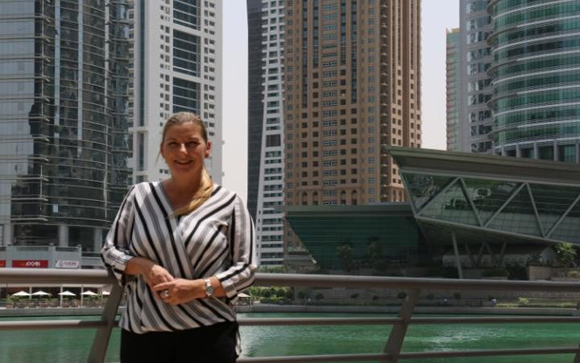For the past three-and-a-half years Heather Churchill has been enjoying the weather and a tax-free salary as an expat in Dubai. After serving with the RAF for 25 years she now works in the Middle Eastern city as an air navigation instructor.
Ms Churchill, 46, is paid £95,000 a year – 30pc of which is her salary, while the rest consists of benefits such as an accommodation allowance and free flights home. She uses her full allowance of £25,000 to rent a two-bed property in the upmarket Dubai Marina.
Her employment package may be attractive, but her job is unstable. The contract is renewed annually and she gives herself five more years in the job, after which she will return to Britain to retire or work part-time as an aviation consultant.
Ms Churchill receives £11,000 a year from her RAF pension. She lets her two-bedroom terrace property in Lincoln, which is mortgage-free, for £500 a month. The property was bought in 2005 for £104,000 and Ms Churchill estimates its current worth at £105,000. She said she “must be the only person I know not to have profited from property”.
She does not want to retire to her Lincoln house but may want to buy another home to live in. She recently put £50,000 in Premium Bonds. She also has £40,000 in an HSBC account in Dubai and £18,000 with Bank of Scotland.
Ms Churchill is able to save £5,000 a month but feels that her cash is just “sat in the bank doing nothing”. She would like to know how to get the best return. She almost invested £50,000 for 10 years through an adviser but when it came to sign she balked at the £16,000 fees.
She would like to have enough money when she returns to the UK to retire mortgage free and go travelling.

Heather Churchill said she ‘must be the only person I know not to have profited from property’.
Jonothan McColgan, a chartered financial planner at Combined Financial Strategies, said: “Ms Churchill’s main consideration at the moment is UK taxation. Even though she is currently a non-resident she is still liable for UK tax on any income in Britain. While her Dubai income is exempt, the income from her pension, rent and savings interest is not.
The first £11,000 falls within her personal allowance, Premium Bond wins are tax-free and savings interest will be paid gross, with tax due only should Ms Churchill’s total income exceed £17,000 and UK interest exceed £1,000 at the same time. So it is very likely that she will have no tax to pay on her UK interest.
However, her rent (after allowable deductions) would be liable to income tax. Therefore, it is important that she declares it on her tax return. If she has not been declaring her rental income, HMRC could go back up to six years and add penalties and interest.
Although Ms Churchill does not think her Lincoln property has appreciated very much it is generating a pretty impressive income of 5.7pc a year, based on her valuation of £105,000. I checked the postcode of the property on Zoopla, which suggested it could be worth £124,000.
If she waited to sell the property on her return there would probably be a tax bill of about £1,500 (based on the Zoopla value). Ms Churchill said she did not want to live in the Lincoln property but might want to buy another.”
Ms Churchill, who used to be in the RAF, wants to continue travelling when she retires.
“It could prove difficult to keep both as any residential property would require UK earnings to justify a mortgage. If you are employed, lenders will require you to be through your probation period. If Ms Churchill became a self-employed consultant she would need about three years’ accounts before any reasonable lender would be willing to offer her a mortgage.
Therefore, she would probably have to sell her Lincoln property to finance any other property purchase.
Ms Churchill is keen to invest. However, with her job under increased uncertainty she would need to make sure she has plenty of accessible cash in case she needs to return home earlier than expected. She may want to consider a savings vehicle such as an offshore investment bond.
There would be no liability to taxes on income, dividends or capital gains while the money remains invested, even when Ms Churchill returns to the UK. She could withdraw 5pc of the original investment every year for a maximum of 20 years. If she did not make any withdrawals these sums could roll forward to allow a larger one-off withdrawal.
If Ms Churchill disposed of this investment after returning to Britain, any gain would attract income tax rather than capital gains tax. Income tax is usually higher, especially as her Forces pension uses her whole personal allowance.”

